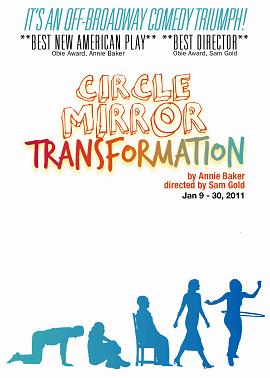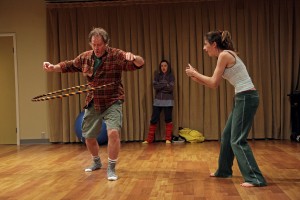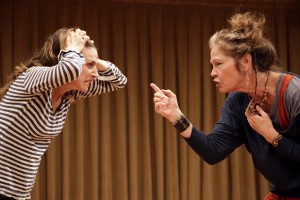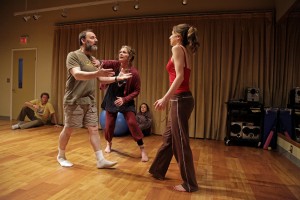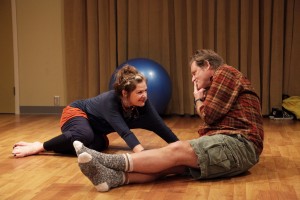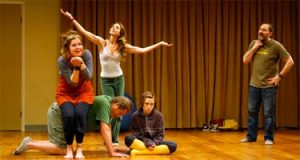REVIEWER ATTENDS AN ACTING CLASS
(A TEACHER leads an acting class for reviewers.)
TEACHER: OK, Tony, imagine you’re writing a review. It has been three days since you have seen Circle Mirror Transformation at South Coast Rep. What do you feel?
TONY: Nothing.
TEACHER: Oh, come on. You can dig deeper than that.
TONY: OK. Really nothing.
TEACHER: Sounds like a cop out to me. (Other students nod in agreement.) Why don’t you start with the plot? Just tell us what you saw.
TONY: Well, it’s about a Creative Drama class in a windowless dance studio in Vermont. The set perfectly evokes a community center feel – you know, mirrors, cubby-hole bookcases and spill lights hanging from the ceiling.
TEACHER: Who designed the sets?
TONY: I don’t remember.
TEACHER: Listen, with this kind of participation, how do you expect to be a great reviewer some day?
TONY: Yeah, but when people read reviews, they usually skim over the plot and the names of the people involved. They just want to know if I recommend it or not. And I don’t know whether I recommend it or not! Just let me be in the indecision, OK?!
TEACHER: (beat.) O.K. (Long silence.) How does it feel from a sensory point of view?
TONY: (Long pause.) Huh?
TEACHER: Is it cold or hot?
TONY: It takes place in summer, but that has no bearing on the play. I mean, it takes place over six weeks and there’s a multitude of scenes, vignettes really, where we watch four students doing acting exercises. In the process, they and their teacher, s-l-o-w-l-y reveal things about themselves. I suppose that if the play took place in winter, there would be too many difficult costume changes.
(Another reviewer/student, STANLEY, hands a program to the TEACHER.)
STANLEY: The scenic designer is David Zinn.
TEACHER: Thank-you, Stanley.
STANLEY: No, thank YOU, teacher. I find your work exemplary.
TONY: (Under his breath.) Kiss-ass.
TEACHER: I can see you’re really defensive right now.
TONY: Well, wouldn’t you be? I mean, this play won the OBIE Award for Best New American Play. It received fairly positive reviews and it’s sometimes funny and sometimes interesting. It certainly piqued my interest. Many issues are touched upon regarding how many times our lives end and start again (just like an acting exercise), but the play never lived up to its premise. So, sure there are some things to recommend, but is it up to me to decide if a play is insubstantial or not? Isn’t that the playgoer’s decision?
TEACHER: Something doesn’t have to be weighty to be enjoyable. Look at Animal House. There must be something more. Investigate, Tony.
TONY: Look, can I just do the exercise where I’m bacon frying in a pan?
TEACHER: Fine, we’ll just get someone else to review the show.
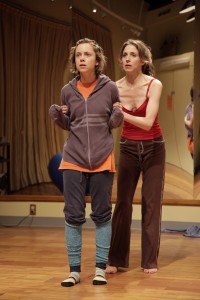 Tony. No, NO! I can do this. (Long silence.) Silence’¦that’s it! There are many moments of silence in the play, like where the five actors lie on their backs calling out numbers sequentially – one to ten – without overlapping each other. If they do overlap, then they have to go back to the number one. During the silences, I thought, ’˜Wow, how cool. The Silence. Very theatrical. Very existential. You know, like Pinter or Mamet-speak.’ But in those playwright’s works, silences spoke volumes. Here, they just felt like long pauses. Towards the end of the nearly two-hour, intermissionless show, even though the device of getting to know these people through seemingly silly acting exercises is great, and the acting is top-notch, and the ending (where two students reflect on where they and the other characters will be ten years from now) is very sweet, I couldn’t help but wonder what, if anything, I was missing in all of those quiet moments.
Tony. No, NO! I can do this. (Long silence.) Silence’¦that’s it! There are many moments of silence in the play, like where the five actors lie on their backs calling out numbers sequentially – one to ten – without overlapping each other. If they do overlap, then they have to go back to the number one. During the silences, I thought, ’˜Wow, how cool. The Silence. Very theatrical. Very existential. You know, like Pinter or Mamet-speak.’ But in those playwright’s works, silences spoke volumes. Here, they just felt like long pauses. Towards the end of the nearly two-hour, intermissionless show, even though the device of getting to know these people through seemingly silly acting exercises is great, and the acting is top-notch, and the ending (where two students reflect on where they and the other characters will be ten years from now) is very sweet, I couldn’t help but wonder what, if anything, I was missing in all of those quiet moments.
TEACHER: So, how does that make you feel? Keep going. Delve.
TONY: Well, I feel stupid. Like I’m not qualified to review.
(At this point, a few of TONY’s fellow reviewers snicker. Some cough uncomfortably. Some hang their head in pity.)
STANLEY: Why can’t he just summarize the plot, acknowledge the playwright for looking at the world in a unique way, and then mention some standout performances?
TEACHER: Hey! I’m the teacher here. If I wanted your review of my teaching, I would have given you two free tickets. Go on, Tony.
TONY: At one point, two actors – who have developed what the playwright Annie Baker calls in her program notes, ’˜the pain of an inappropriate crush,’ – leave to make-out during a bathroom break. The stage is now empty and quiet. Quiet and empty. I’m sure Baker was presenting a slice-of-life moment of awkward silence. Personally, I could only wonder if an actor had missed a cue. The pause felt interminable. I didn’t hate it, I just didn’t get it. (Tony starts getting vulnerable.) Yeah, it’s A Chorus Line without the songs, a long first act without the second’¦ (Tony starts to cry.) ’¦a meaty device that lacks sustenance’¦
TEACHER: So, what you’re saying is that, for all the good intentions and lovely performances, the play just didn’t resonate for you, and therefore, you can not wholly recommend it? (Tony nods.) So, what’s going on for you right now?
TONY: I dug right down to the bottom of my soul and cried, ’˜cause I felt nothing.
++++++++++++++++++++
photos by Scott Brinegar/SCR
Circle Mirror Transformation
South Coast Repertory, 655 Town Center Drive in Costa Mesa
Tues-Fri at 7:45; Sat & Sun at 2 and 7:45
ends on January 30, 2011
for tickets, call 714.708.5555 or visit SCR
